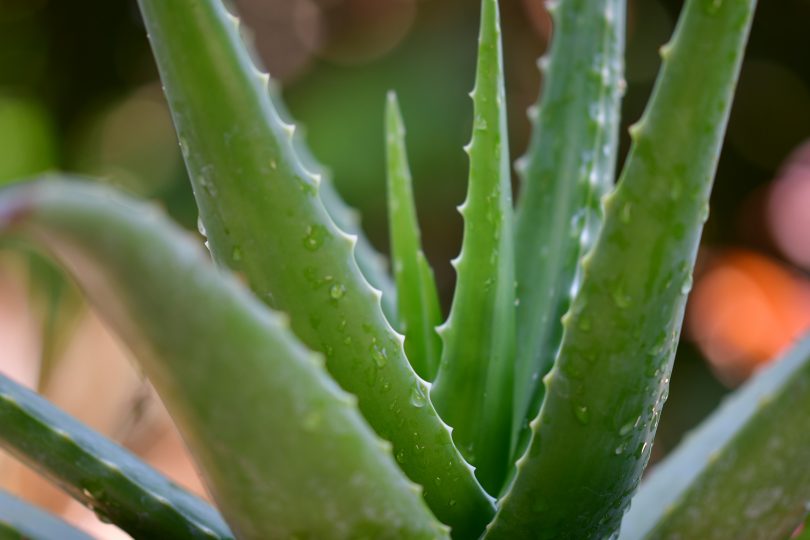I don’t know about you, but my skin is becoming even more sensitive as I age. When I was younger I was always ‘one of those children’ who had various allergies, mainly to food or body products. Later when I was studying at university I had a mild stroke, I was in my early twenties. It came out of nowhere and as I was studying hard and also working as a psychologist with many troubled souls, the stroke was attributed to stress. Through complementary therapy and self-healing I made a full recovery, in most ways. The exception was in the sphere of allergies. Because of the stroke my body had changed and my tolerance to chemicals, additives and certain foods and herbs became unbearable. I became severely allergic to basil, just one brush against my skin could lead me to the hospital doors in double quick time!
My intolerance to certain foods, additives, herbs and chemicals is also increasing slightly as I mature. Unbelievably, I am now intolerant to cat food! We have a number of feral cats who visit our barn each evening. My husband and I have set up beds within cat carriers for them in the barn that contain fleece blankets and each evening we religiously put out dishes of goats milk, moist cat food and a leading brand of dry complete kibble. Twice I have handled the dry kibble, scooping them out of the glass jar containers and on these 2 occasions I have been plagued by severe itchy skin, dry and gritty eyes within minutes of handling the food. These symptoms only eased after a smothering of calendula and lavender essential oil.
With this in mind I decided to write this article about skin soothing herbal oils of which will nourish and benefit any skin that has suffered from the drying winds and the biting cold of winter.
Coconut oil is used for general moisturising, and as a fine cleanser for the skin. It also acts as a mild oil suitable for those with inflamed and irritated skin, as well as skin sensitivities. It is a natural emollient, and is deeply moisturising. It is good for rejuvenating dry, stressed and ageing skin, as well as delicate skin around the eye area. Coconut butter extracted from coconut is a good emulsifier for making creams and lotions. It prevents destructive free-radical formation and provides protection against them. Coconut oil helps remove the dead cells of the skin, making it smoother. This is an ideal base in which to add your own essential oils. If you buy the organic food grade, coconut oil can provide the human and animal body with essential key nutrients and have even been named as a superfood!
Sunflower oil is found within many kitchens, yes it is the same variety that you may use for frying food! This oil helps to moisturise, regenerate and condition the skin. Application of sunflower oil increases the linoleic acid level of the skin, lowers trans-epidermal water loss, and helps to eliminate scaly lesions common in patients with essential fatty acid deficiency. Sunflower oil can be used as a main oil, or in a blend, for lotions, salt scrubs, bath oils and massage oils. It is good for mature, sensitive, dry or damaged skin.
Calendula oil is my personal favourite as it’s slightly thicker than other base oils and stays on the skin for quite some time before being rubbed in completely. The flavonoids, found in high amounts in Calendula, account for much of its anti-inflammatory activity – great for puffy ankles if you have a job that involves prolonged standing. The oil is used in soaps and cosmetics. It is a good moisturising agent, especially for dry skin. It is also an exceptionally good skin conditioner, and is well-known for its ability to repair damaged skin. It protects the skin against sun and chemical damage by supporting the skin’s natural defences against UV-induced collagen breakdown. Acne scars can disappear with regular use of Calendula. Studies suggest that topical use of Calendula may benefit the healing of wounds by helping the body regenerate damaged tissues, and by acting as an anti-inflammatory.
Aloe vera is a very nutritious oil as it contains proteins, carbohydrates, vitamins (including B1, B2, B3, B6, C, and folic acid) and minerals. These nutrients, although beneficial individually, may work synergistically to soothe, heal, moisturise and regenerate the skin. Aloe vera accelerates the healing of wounds, helps skin burns and moisturises dry skin. Aloe gel works as a cleanser, and is said to promote cell proliferation. It also helps to remove dead skin cells. It is recommended for young skin that is prone to acne, as well as oily and mature skin for its stimulation of collagen production. It moisturises the skin because it has a water holding capacity. I have a couple of aloe plants and if ever I have burnt myself or any of my animals have a scab or wound, I simply reach for a leaf, cut it in half and apply the sticky gel directly onto the skin.
As with any new product and especially if you have bizarre reactive skin like me, a patch test in the crook of the elbow is always wise to test for allergies or any untoward reactions.
Herbs have played an integral part in the development of modern civilisation. Fortunately, people are becoming conscious of the long-term side-effects of synthetic products, and herbs are once again staging a dramatic comeback. The success stories on the use of herbs have raised them to the top of the popularity graph. As a result, in the recent years, the cosmetics industry has started focusing on the use of herbs, and is conducting extensive research on plant materials and their combinations in their various products. It is now time for you to make them a part of your life and enjoy the benefits gifted to you by Mother Nature.



